
Thoughts About the Flame Novels
by Sylvia Engdahl
Portions of this essay previously appeared in an autobiographical section of my ebook Reflections on Enchantress from the Stars and Other Essays but were moved to a separate essay because it is of interest to all adult readers of my novels. Other portions originally appeared in an Afterword to Defender of the Flame that has been deleted.
*
I have found that many adult readers of Enchantress from the Stars are unaware that late in my life I have written five science fiction novels for adults. They haven’t been widely distributed in paperback form since they are print-on-demand editions and therefore expensive, but they’re available electronically for $2.99 each from all ebook retailers. They are my only novels apart from Journey Between Worlds that deal with our own human race rather than purely imaginary ones, and thus present my personal view of the future of Earth and colonists of Earth ancestry.
Of course none of the specific situations and events in them are intended as predictions. Rather, these novels express an underlying outlook toward the universe that I believe is more valid than the pessimism and misanthropy so prevalent today. Despite the evils of each era humankind as a whole has progressed over the long term, and will continue to do so unless we fail to escape from confinement to one small planet we have outgrown. It is fashionable to doubt this, but not realistic. The many past predictions of doom have proven false.
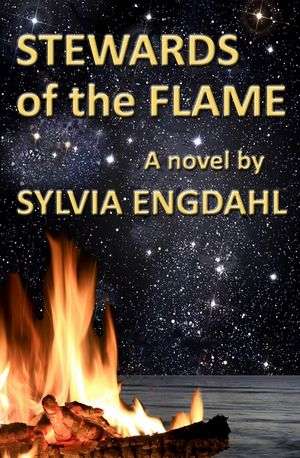
As time goes on I am more and more frustrated by the fact that comparatively few adult fans of Enchantress, or even of Children of the Star, have read my adult novels. Maybe the rest are interested only in books appropriate for kids. Before I wrote these novels, I often received email from admirers of my previous books begging me to write another, but when I did, I received little feedback; and not enough copies, even of the inexpensive ebook editions, have been sold to account for more than a fraction of the people who praised my earlier ones. If the Flame novels hadn’t gotten good reviews I’d assume they simply aren’t praiseworthy, but many reviewers’ enthusiastic comments suggest otherwise.
To be sure, Stewards of the Flame is a controversial book and deals with issues that make some readers uncomfortable; I never expected everyone to like it. But enough reviewers did to make me wonder why it’s had so little notice from my existing fans. Moreover, it saddens me that so few have read the other four books, since many people like, or would like, the later ones better. It’s common for indie authors to make the ebook edition of the first novel in a series free, once sequels have appeared, in order to attract readers to them; but in my case this strategy backfired—evidently the majority of those who downloaded Stewards were turned away by it.
Yet the four later books don’t deal with the medical issues that make Stewards controversial, and they also have more action of the kind expected in science fiction. They don’t depend on having read the first book, and so I avoid calling the Flame novels a series; I refer to them only as a duology and a trilogy, because the third book begins an entirely separate story with different characters, set two centuries later than the first two. Furthermore, as the trilogy deals with several of the main themes of Enchantress from the Stars and The Far Side of Evil—not only with the development of psi powers, but with our world’s place in the universe—adults who liked the ideas expressed in those books would therefore find them interesting. But so far, my efforts to get readers to start with the trilogy haven’t been successful. It was a mistake, perhaps, to use “Flame” (which symbolizes the advancing powers of the human mind) in all the titles, as it may give the impression that all five books must be read when in fact each can stand alone.
As I have often said, it’s a mystery where my story ideas come from—I know only that I can’t generate them intentionally. I had written the initial chapters of Stewards of the Flame in 1989–1990, inspired by my strong feelings about the fallacies underlying today’s medical policies; but as with all my abortive attempts to produce another novel, I’d been stymied by inability to think of events for a plot. I realized that the characters might need to establish a new colony, but I couldn’t figure out a way for them to get aboard a starship and in any case, I knew escape from their world would be a mere narrative rather than a story with dramatic structure. A story has to build up to something unanticipated, some change in what its characters expect from the beginning. I definitely did not want them to bring down the government they opposed, not only because it would be impossible under the premise I’d established, but because that would destroy the point I was trying to make—that the tyrannical policies of the medical authorities were solidly supported by the voters who had been indoctrinated with their views, something that I fear is well on the way to happening in our own society.
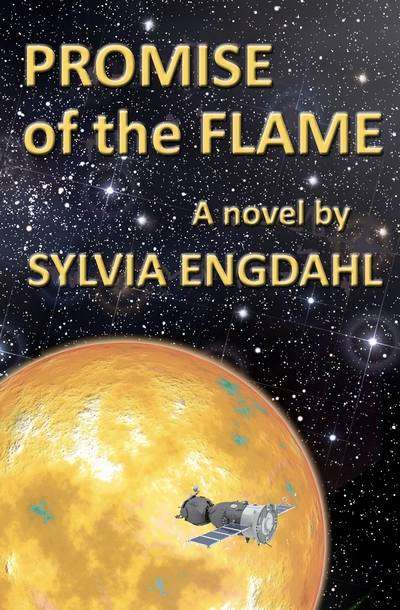 Moreover, the medical policy issue
was not the only one I wanted to deal with in the novel. My initial aim apart
from that was to explore in a story for adults some of the ideas in Enchantress from the
Stars and The Far Side of Evil: specifically, how would a future society similar to our
present one take the first steps toward becoming a “mature” civilization as described
in those books? How would we begin to develop the paranormal mind powers that
characterized that civilization? It would have to start somewhere in a small way; the
human race wouldn’t be transformed overnight. To this end, I gave the characters in
Stewards the same powers possessed by Elana's people, though in a less advanced
form; and this had to be significant to the plot in a more specific way than as the motivation
for their opposition to the materialistically-oriented society in which they were living.
Moreover, the medical policy issue
was not the only one I wanted to deal with in the novel. My initial aim apart
from that was to explore in a story for adults some of the ideas in Enchantress from the
Stars and The Far Side of Evil: specifically, how would a future society similar to our
present one take the first steps toward becoming a “mature” civilization as described
in those books? How would we begin to develop the paranormal mind powers that
characterized that civilization? It would have to start somewhere in a small way; the
human race wouldn’t be transformed overnight. To this end, I gave the characters in
Stewards the same powers possessed by Elana's people, though in a less advanced
form; and this had to be significant to the plot in a more specific way than as the motivation
for their opposition to the materialistically-oriented society in which they were living.
Warning: the next portion of this essay
contains spoilers. Skip them if you haven't read the Flame novels.
I had abandoned the hope of turning my partially-formed ideas into a novel because it dawned on me that the protagonists’ horror at the prospect of eventually being placed in stasis after death, though emotionally valid in terms of what it symbolized, was not really reasonable in the sense of a personal fear—since they knew the bodies in stasis were dead, why should they fear it more than any other form of burial? And if they weren’t afraid of it, there wouldn’t be any ongoing suspense. So with regret, I had put the draft chapters away and had forgotten about them. Then, fifteen years later, I came across them one day while reorganizing my hard disk, and I was suddenly struck with the idea of the characters having to go into stasis to save themselves when the starship ran low on life support. That was the climax I had tried in vain to imagine. That’s how it always is with me; my stories have taken years to emerge, except in the case of additional novels about the same characters and/or world. And always I start with the ending, becoming able to think of most earlier incidents only through leading up to it.
I have found, both in discussing Stewards with people and from reviews, that not everyone considers its ending ironic. Comments have ranged from “a flat ending” to “the best ending I’ve ever read.” This seems to depend on whether or not a reader views the concept of putting dead bodies in stasis as horrible. To me, it is so horrifying that I was amazed to discover that not everyone feels that way. About half the book’s readers share my feeling. The other half react with “So what?” and of course to them, the idea that the people aboard the ship would resist going into stasis isn’t believable; there are even some who think permanent stasis is a good idea. (After all, there are people today who arrange for their bodies to be frozen after death under the impression—in my opinion, sadly mistaken—that a human being is no more than a potentially-repairable biological machine.) Such readers don’t grasp the extent to which the characters’ overcoming of their fear crystallizes the story’s theme. So Stewards is controversial not only in the sense that many readers disagree with its view of medical care, which I expected, but because some don’t feel its conclusion is dramatic. A novelist who doesn’t write formula fiction cannot please everyone.
While writing Stewards of the Flame I didn’t plan to write a sequel. Though I later discovered that its ending is generally viewed as a cliff-hanger, to me it was an open one on which elaboration would be anticlimactic. I thought most readers would assume the starship got to the new world, and that any who didn’t would still feel the point had been made and the story was over (although now that I know not everyone got the point, I see why the book seems incomplete). By the time it was finished, however, I was absorbed with the characters and wanted to know what happened to them in the new colony. As Promise of the Flame was a continuation I was able to write a good deal of it without knowing how it would end, which I cannot do with a new situation. And because I always get my inspiration for the details of the action while writing rather than ahead of time, the incident with which Promise ends came to me soon enough so that I didn’t get stalled. The book was well underway before Stewards was published.
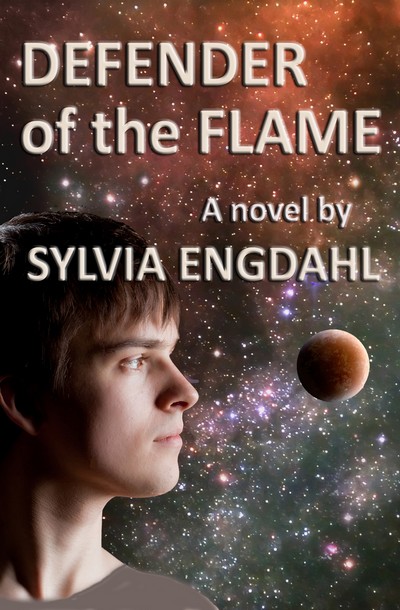
Once the founding of Maclairn was complete I assumed there was nothing left to say. I added the Epilogue because I realized that readers would wonder whether the colony was ever discovered, but I didn’t expect to write a novel about that era. I sometimes thought about how Earth would respond to the discovery, though, and the character of Terry Radnor began to form in my mind. And suddenly, one night nearly three years after publication of Promise, the idea of his encountering a Service ship hit me, and I knew that would make a new story. It’s the crucial events a novel requires that I can’t produce by trying; they rise unbidden from my unconscious mind when I least expect them.
Although one of my main goals in writing Stewards of the Flame had been to explore how humankind might begin to acquire the psi powers possessed by Elana and her people, I’d had no intention of ever including the Service and Earth in the same book—after all, one of the main features of Enchantress is that it doesn’t say in what era of our history Elana lives. But bringing the Service into a series specifically about our future does not affect that; I envision the Service as virtually eternal, observing countless new civilizations and bringing them into the Federation as they mature, so whether Elana herself met our ancestors or was one of our descendants is irrelevant to the issue of our first contact with it. Since I believe that the a sapient species' acquisition of the psi powers is essential to meeting more advanced species as equals. it became obvious to me that the Service would view Maclairn as the key to Earth’s readiness, and I wondered why it had taken so long for that to occur to me.
It was also obvious that it would be necessay for them to hide their existence from the Maclairnans until the time was ripe, and that an accidental meeting with Terry would thus put him in a very difficult position. Writing the part of the book leading up to that meeting, and the meeting itself, went quickly. But though I knew they would send him to Ciencia, I had little idea of what would happen to him there until I’d reached that point. I did know how the book would end, however, and wrote the last chapter long before the middle; it served as my inspiration to press ahead when I was having trouble filling in what preceded it.
Surprisingly, one of the main themes of the story—the unfathomable process of fate, of synchronicity—was not clear in my conscious mind until it was finished. I’m aware that some readers assume the providential “coincidences” in my novels, such as the finding of the alien sphere in Beyond the Tomorrow Mountains and the remarkable chain of events that put Terry in a position to save Maclairn from terrorists, are merely deus ex machina occurrences I included because I couldn’t think of any other way to get my characters out of trouble—especially considering my admitted difficulty in thinking up action. But in reality, these are deliberate. Even when not consciously planned, which they weren't in Defender, they are a reflection of my underlying belief. One of the greatest mysteries of life is that significant occurrences often do involve synchronicity. Its role in individual destiny, and in the course of events that depend on an individual being coincidentally at the right place at the right time to change history, is the focus of the Captain of Estel trilogy whether or not any readers consider that aspect of the plot valid.
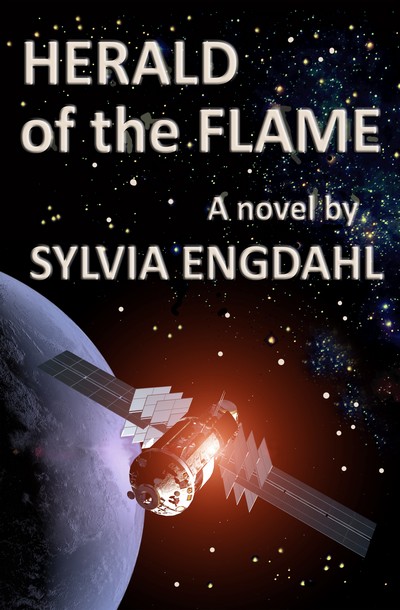
Again, when I published Defender I had no thought of writing another book. I felt Terry’s later life of travel between the stars could be left to readers’ imagination. But my own belief that something like the Service exists in the universe made me speculate on how extraterrestrials would—will—go about contacting Earth once we develop sufficient maturity to be viewed as equals.. They certainly won’t appear in UFOs and announce themselves. I realized that if there were a colony like Maclairn it would be an ideal site for the initial contact, and the aliens’ existence would be kept secret until such time as Maclairn’s other secrets could be safely revealed.
They had told Terry that first contact was several generations away, and it dawned on me that assuming he lived as long as the Maclairnans did, he would still be alive by then. What irony, when he’d been exiled to prevent disclosure of the secret, for him to live into the era when keeping it wouldn’t have been necessary—he was born just a little too soon. Or was he? It struck me that since Terry already knew about them, he would be by far the best person to take part in the revelation. He could be allowed and even encouraged to return to Maclairn, which neither he nor I had thought could ever happen. Once I saw that, all of Herald of the Flame grew from it; I could hardly wait to let readers know that Terry got back to Maclairn.
As usual, I wrote a draft of the
last chapters before the rest of the book, and more than in any of my previous
novels, I made up earlier events as I went along—yet it took less time to write than
the others. The one incident I had trouble thinking of was the climactic encounter
with Quaid. I knew there would have to be one, that it would result in Jon’s
death and Terry’s imprisonment, and that it must in some way bring about a
conclusive defeat of Maclairn’s enemies; but I had no more notion of what could
accomplish this than he did. The entire book on both sides of those two middle
chapters was finished before I figured it out.
Many readers of Enchantress from the Stars have been curious as to what I conceive as the key factor in the distinction between a “youngling” human species and a mature one, which in that book is assumed to be clear-cut. I have never pictured it as arbitrary, as if the older species simply considered themselves more advanced by some subjective standard. Nor do I view it as a merely cultural difference; contrary to the assumption of some readers of Enchantress from the Stars, that story is not applicable to relationships between cultures that might simultaneously exist within a single species. I believe there is an actual difference between a young “human” species and an older one based on its evolution over time, just as there was an actual difference between prehistoric humans and those that developed language and the use of tools. In my opinion this evolutionary process has not ended. In a future era when interstellar travel is commonplace, humans will develop greater capabilities than most of us have today. In Herald of the Flame, where for the first time I dealt with Federation worlds, I went into this briefly, but did not fully develop the theme until much later when I wrote Envoy of the Flame. There, the Service's criteria for classifying a species as mature are specifically stated.. There are three: A significant percentage of a world's population must be consciously telepathic, because otherwise they could not perceive the emotions and intentions of alien species whose body language offered no familiar clues, let alone hold their own in a telepathic culture. They must have developed interstellar travel and colonized planets of many stars, not only as evidence of technological level but because aggressiveness cannot be outgrown as long as a species is confined to a single world with limited resources. And they must make no distinctions between people based on racial or other physical differences, for a culture must be wholly free of racism in order to be integrated into a multispecies society—and even then prejudice will arise, particularly with respect to interspecies marriage, an issue that plays a part in the plot of Envoy.
The last thing I expected was to write a new novel at the age of 87, seven years after what I'd thought was my last one, while confined to a residential care facility. But my laptop is my best friend, and perhaps having nothing but free time served as an impetus. Like all my story ideas the one for Envoy of the Flame came to me as a surprise. Some time before, a reader had asked me who in my view was the first from Earth to meet aliens, Terry in the Captain of Estel duology, or the characters in my coauthored story “The Beckoning Trail" (in Universe Ahead and the ebook edition of Anywhere, Anywhen). My first thought was that since the latter was a short story and few people had read it, it didn't need to be consistent with my novels. But later I began thinking that perhaps there wasn't any conflict; after all, the presence of aliens on Maclairn had not been revealed to Earth. From this speculation Envoy was developed, using the short story as a Prologue; but as it grew it turned more and more into a story about the influence Terry, as the Captain of Estel, had on his successors. The role of characters from my then-duology about him kept increasing. Unlike my past novels, this one was written without my knowing the ending--I just kept adding to it day by day, making up the action as I went along. And though its protagonist is the heroine of the previously-unrelated short story, it completes Terry's story, and Maclairn's, just as if that had been planned.
However, because I didn't have trouble thinking of incidents and because I was alone all day with no other work to interfere, I wrote that novel much faster than my others--too fast. As a result I published it without giving it a chance to get "cold." When I reread it more than a year later, I was dismayed by the deficiencies that I hadn't noticed before, not with the story but with passages that needed more description or were unreasonable, or contained minor inconsistencies. Moreover the Service, which in my other novels I'd portrayed as wise, came across as a rigid and rather stupid bureaucracy because I had failed to state a basic principle of its policy and hadn't revealed what went on behind the scenes. For the first time I was truly dissatisfied with a novel; but one of the advantages of indie publishing is that a book is never frozen. I withdrew the original edition from the market and revised it, offering a free new ebook to readers who had bought the old one, which can be identified by a cover showing a woman's face; and I hope not many people still have that edition.
Readers may wonder why, having
always said I write about space because I want to express ideas about its
importance, I chose to write five novels in a row that focus on psi instead.
Well, when I published Stewards I had been writing about space for nearly
forty years and had reached theage where I was increasingly aware that I didn’t have a great deal of time left
to present my thoughts about other issues I feel are significant. Moreover, space colonization is a premise of the Flame novels in a larger sense than the inclusion of starships and the fact that their plots prevent them from being
set on Earth. To turn to “inner space” before making sufficient effort to spread into outer space, as some people
advocate, would be self-defeating, since colonization of space is vital to our long-term survival. Thus at the stage where advanced psi powers become widespread, there will necessarily be many colonized worlds; the mere
assumption that the two developments are inseparable is in line with what I've been saying all along.
How much more of what’s in the Flame novels can be taken literally? Not much.
People hundreds of years from now will live very differently from the way we do, We do not know what the culture of these future humans will be like, and so in fiction I portray it as like ours. There will be technologies then which we now cannot even imagine, and people’s customs will be different from the way I describe them. Unlike many authors of science fiction, I do not attempt to show difference merely for the sake of difference; since imaginary cultures are no closer to future reality than is ours, I see no advantage to lessening reader identification with my characters. Culture is merely the framework of a story, like the language in which it is written, whereas its substance concerns human potential and human values. Thus I make no apology either for major anachronisms or for my use of familiar science fiction devices, such as starships that travel rapidly between stars in violation of our present conception of the laws of physics. Such tropes are simply a means of communicating with today's readers; they do not pretend to be a description of future technology.
The novels’ portrayal of paranormal capabilities, on the other hand, is closer to what is actually known, although in some cases intentionally exaggerated. Telepathy, clairvoyance, and precognition are known to exist. Remote viewing has been put to actual use. (Information about this, including a list of excellent nonfiction books by respected scientists, can be found at my website.) The big question is how such capabilities, which are now usually unconscious, will come under conscious control and be extended to the public. I doubt if a colony will be founded specifically for that purpose, as happens in the story; but I do think an isolated society in which mind power and technology are equally valued will be needed to spearhead psi’s development by the majority of humankind.
Do I really believe we will eventually meet extraterrestrials? Yes, I do, and for the reasons stated in Envoy of the Flame I believe that contact will be essential once our species reaches maturity. Certainly aliens won't be revealed on Earth in the same way they are in Envoy, which is a mere plot device; but when the time is ripe
they will come once they are sure they will be welcomed. I don't believe we will discover them until they take the initiative, for I am entirely serious about all I have said in my novels about their concealing their existence from peoples who are not ready. And we are still a long way from meeting any of the three criteria that I believe constitute readiness.
If you are interested in issues such as these, do read some or all of my Flame novels
and let me know what you think of them. More about them, and about topics they deal
with, can be found at my website, and I welcome email.
Copyright 2017, 2021 by Sylvia Engdahl
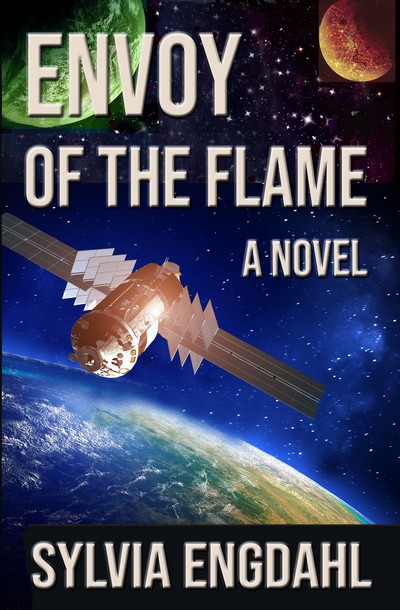
All rights reserved.
This essay is included in my ebook Reflections on Enchantress fron the Stars and Other Essays